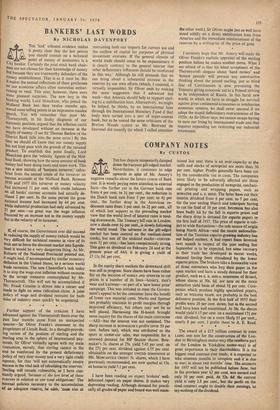By NICHOLAS
DAVENPORT TEE 'leak' tribunal evidence makes it pretty clear that the last person you should consult on a technical point of money or economics is a City banker. Certainly the joint stock bank chair- men are not chosen for their knowledge of money but because they are trustworthy defenders of the money establishment. That is as it must be. But it makes the annual reflections of these gentlemen on our economic affairs often somewhat embar- rassing to read. This year, however, there were some pleasant surprises. The new boy in the banking world, Lord Monckton, who joined the Midland Bank less than twelve months ago, scored some telling points in an impressive maiden speech. You will remember that poor Mr. Thorneycroft, in his faulty diagnosis of our economic position, argued that the inflation could not have developed without an increase in the supply of money. (I see Sir Thomas Barlow of the District Bank falls into, the same error.) By this time we should all know that our money supply has not kept pace with the growth of the national Product. To establish this point finally, Lord Monckton gave the `velocity' figures of the Mid- land Bank, showing how the same amount of bank Money had been doing more and more work. This Was a new statistic of 'business turnover,' calcu- lated from the annual totals of the turnover on current accounts at the Midland Bank, Between 1950 and 1957 this turnover or money velocity had increased 51 per cent. while credit balances on all banks' current accounts had actually de- clined 2 per cent. In the same period the gross national income had increased by 64 per cent. while industrial production had only advanced by 21 per cent.—so great was the wage inflation financed by an increase not in the money supply but in the velocity of its turnover.
If, of course, the Government ever did succeed in reducing the supply of money (which would be very difficult for technical reasons in view of its Wish not to force the discount market into liquida- tion) it would be a very dangerous thing. As Mr. Robarts of the National Provincial pointed out, it might lead, if accompanied by similar monetary deflation in the United States, to a serious world trade recession. The new Chancellor's task today is to stop the wage-cost inflation without recourse to the savage measures contemplated by Mr. Thorneycroft. This will not be accomplished if Mr. Frank Cousins is driven into a corner and made to fight on some ridiculous claim. A joint Policy of wage and dividend restraint for both sides of industry must quickly be negotiated.
* *
Further support of the criticism I have advanced against the Thorneycroft thesis over the Past four months came from an unexpected quarter—Sir Oliver Franks's statement to the Proprietors of Lloyds Bank. In a thought-provok- ing review of the position of sterling and the sterling area in the sphere of international pay- ments, Sir Oliver virtually agrees with my main contention, namely, that sterling cannot in the end be reinforced by the present deflationary policy of very dear money and a very tight credit squeeze, for that `will not automatically ensure success in the vital task of rebuilding the reserves.' Sterling will remain vulnerable, as I have con- stantly argued, 'because of the low level of these reserves in relation to our total obligations.' The internal policies necessary to the accumulation of an adequate reserve, he adds, 'must aim at
restraining both our imports for current use and the outflow of capital for purposes of physical investment overseas. If the general climate of world trade should cease to be expansionary it is clearly contrary to the general interest that other deflationary influences should be reinforced in this way.' Although he still pretends that we can bring about a substantial increase in the reserves by our own efforts (which, I contend, is virtually impossible), Sir Oliver ends by making the same suggestion that I advanced last week—that America should help to support sterl- ing by a stabilisation loan. Alternatively, we might be helped, he thinks, by an international loan through the International Monetary Fund if that body were turned into a sort of super-central bank, but as he voiced the same criticisms of the Bretton Woods system as Mr. Bertrand de Jouvenel did recently (to which I called attention
the other week), Sir Oliver might just as well have America and the immediate reinforcement of the reserves by a writing-up of the price of gold.
I earnestly hope that Mr. Amory will study Sir Oliver Franks's realistic appraisal of the sterling position before he makes another move. What I am afraid of is that his blind acceptance of the Thorneycroft slogans about 'hard money' and `honest pounds' will prevent. any constructive thinking about the pound sterling, just as blind fear of Communism is now preventing the Treasury giving economic aid to a Poland striving to be independent of Russia. In this harsh new world, in which we have to struggle for survival against great continental economies or totalitarian economic systems, we shall never succeed if we adopt the stupid deflationary restrictionism of the 1920s. As Sir Oliver says, we cannot escape having to earn our living by international trade and that requires expanding not restricting our industrial investment.






































 Previous page
Previous page